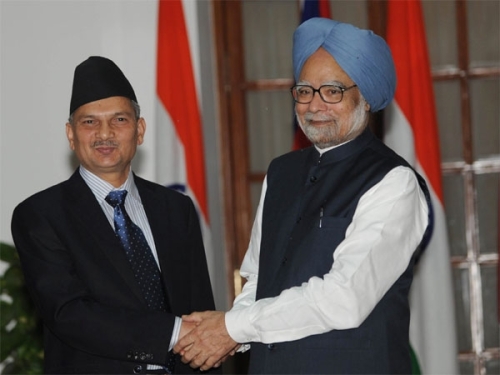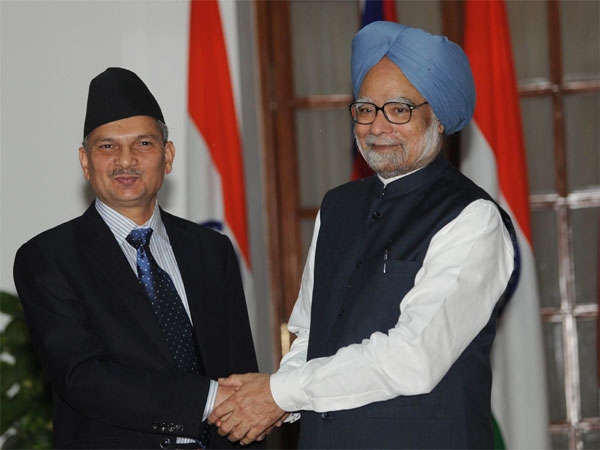
Nepal, India ink two major deals including BIPPA
-
BIPPA a calculated gamble: PM
By Akhilesh Upadhyay and Mahesh Acharya
in The Kathmandu Post
Nepal and India singed two major agreements, including the much-talked about Bilateral Investment Promotion and Protection Agreement (BIPPA), here late on Friday (yesterday). This brings to a close days of hectic negotiations and speculations over the fate of BIPPA, which India has sought to protect security for its investments in Nepal.
Minster for Industry Anil Kumar Jha and Indian Finance Minister Pranab Mukherjee signed the agreement at Hyderabad House, the government venue for high-level negotiations in India. Prime Minister Baburam Bhattrai and his counterpart Manmohan Singh were present at the signing.
The two sides also agreed to a $250-million line of credit to finance infrastructure projects such as highways, airports and bridges. The credit line was announced during President Ram Baran Yadav’s state visit to Delhi last year. In the run-up to the visit, PM Bhattarai is known to have pitched for a $1 billion and was expecting even more, government sources said. India responded positively, according to officials.
Another agreement that was expected to be signed–Double Taxation Avoidance Agreement (DTAA)–did not materialise. The PM said the DTAA, which was on the agenda, could not be signed because of ‘miscommunication’ between the two countries.
The DTAA is expected to be inked in the near future in Kathmandu during the visit of Indian Finance Minister Pranab Mukherjee, an official said.
According to the terms of BIPPA, investments from either country in the territory of the other country are to be accorded national treatment (NT) and most favoured nation (MFN) treatment.
Provisions have also been made in the agreement for grant of compensation to the investors whose investments suffer losses owing to war, armed conflict and a state of national emergency. This was the most contentious issue and a section of the bureaucracy had expressed reservations over the clause, fearing that it is open to a broad interpretation and could lead to huge liabilities to the Nepali state.
According to a Nepali official who was part of the bilateral talks, many more issues will be covered in a joint communiqué.
On his part, Bhattarai said he had assured India that Nepal wants good relations with both its neighbours, and ‘will not allow Nepali soil to be used against its neighbours’. During the one-on-one meeting between Bhattarai and Manmohan Singh, the two talked about expanding economic cooperation.
‘A calculated gamble’
Following a significant bilateral deal to provide protection for Indian investments in Nepal, PM Baburam Bhattarai said he was well aware that the Bilateral Investment Promotion and Protection Agreement (BIPPA) could invite criticism in Nepal, clearly indicating that the move was a calculated political gamble.
“I took the risk. I am well aware of the possible backlash. This was my gamble and it will pay off,” Bhattarai said.
After talks with Indian PM Manmohan Singh and other top leaders, Bhattarai said groundwork has been laid to build a new relationship between Nepal and India.
“This was important because there was some misunderstanding between India and Nepal, especially with our party. Though I came (to New Delhi) as prime minister, they saw me as a Maoist prime minister. I succeeded in explaining to them our position.” He met Finance Minister Pranab Mukherjee in the evening and External Affairs Minister SM Krishna in the morning.
The PM said he was much impressed by the consistency of messaging by all the Indian leaders, which showed their common concerns.
In his 30-minute one-on-one with his Indian counterpart, Singh expressed his concerns over the peace process, security issues and economic cooperation.
The Indian side was open to discuss the 1950 Treaty of Peace and Friendship. The two sides agreed to approach it in a new way with the formation of an EPG (Eminent Persons Group), which will have four persons from each side. The EPG will also look into broader bilateral issues, such as border and economy. It will hand its proposal in a year.
Delhi’s civil society warms up to India-educated Bhattarai
By Akhilesh Upadhyay
When Prime Minister Baburam Bhattarai arrived in the Indian capital on Thursday, he perhaps didn’t realise juggling various constituencies in such a short visit was going to be a delicate task. What he perhaps knew already was that he could count on the new-found Indian goodwill towards his party and towards him, a leader who could conclude the much elusive peace process.
At a packed hall in the Constitutional Club, old-school socialists, including those who knew him from his JNU days, wanted to hear from the Maoist leader that he was not going to abandon the cause of the working class and the down-trodden.
A loose coalition of individuals and organisations, which actively supported the 2006 Jana Andolan, was keen to see him voice his commitment to democracy and human rights. The Indian business community, the biggest foreign investor in Nepal, wanted assurance for the protection of its current and prospective investments.
Two days since his arrival here, where he got married 30 years ago with a fellow comrade Hisila Yami in a wedding solemnised by Swami Agnivesh, then a state legislator, there’s a broad agreement that the New Delhi-educated leader has handled the expectations quite well.
He has been trying to communicate to the Indian constituencies
that he is clear-headed and is intent on making a paradigm-shift in Nepal-India ties. “My special test is to build the trust between the two governments and the two peoples,” he said at a Nepal Democracy Solidarity Committee forum on Thursday evening, “to start a new chapter in our relations. Without prosperity, we can’t have strong nationalism. If you are weak, your nationalism is hollow.”
Prosperity has been a recurrent theme in all his addresses here and he seems willing to go far to source investments for the cash-strapped Nepali economy.
He has been a strong advocate of two investment protection agreements, the much talked about BIPPA (Bilateral Investment Protection and Promotion Agreement) and the Double Taxation Avoidance Agreement (DTAA), which he believes will lead to greater Indian investments.
Two-thirds of Nepal’s economic activities are with India and there is a strong voice in the Indian business community here that it needs greater protection for its investments in Nepal.
While no one questions the fact that Nepal needs to put its house in order to encourage foreign investments, there’s no dearth of goodwill in New Delhi for Nepal, UCPN (Maoist) and Bhattarai.
“Baburam Bhattarai’s maiden visit to India as Nepal’s prime minister,” wrote The Times of India in its editorial on Friday, “presents a historic opportunity for both countries.” All political meetings and negotiations on the bilateral instruments between the two sides took place later in the day.
“Nepal needs India to boost development and put its economy on a high growth trajectory,” said the editorial. India is presented with an opportunity to renew ties with a key regional player, it said, calling the Maoists “a significant force in Nepal’s political landscape.” The paper, echoing the voices in the larger civil society, was willing to give Bhattarai benefit of the doubt that he could lead Nepal out of its current unstable phase.
“If India is to reap the benefits of friendly relations with its neighbours,” urged the paper, “it must start taking its neighbourhood seriously. And this doesn’t mean an exclusive focus on Pakistan or China.”
Bhattarai meets Indian counterpart Singh
Prime Minister Baburam Bhattarai, who is on a four-day official visit to India beginning Thursday, held an important talks on bilateral cooperation with his Indian counterpart Man Mohan Singh here in New Delhi.
Issues of extradition treaty and Air Marshall were expected to figure during the meeting held at the prime minister’s residence Hydrabad House.
In a meeting between PM Bhattarai and Indian External Affairs Minister SM Krishna earlier on Friday, the Indian foreign minister hinted that the issues of extradition treaty and Air Marshall would be discussed in the meeting between the premiers of two countries.
“It is an important issue to be noted. The PMs will talk about this issue at the meeting,” Krishna said, responding to the mediapersons’ queries regarding the extradition treaty and Air Marshall.
Although the extradition treaty has been a major part of most of the Nepali PM’s visit to India, the two countries are unable to renew the treaty, even years after it has expired, due to the Indian obstinate in transferring the third-country-criminal to India.
However, PM Bhattarai said that the meeting did not go futile. Stating that the peace process and the constitution are the internal affairs of Nepal, Bhattarai said that the Indian government has committed to assist the Nepali leaders for the same – keeping in mind the welfare of the Nepali parties.
PM asks India to support peace process
Prime Minister Baburam Bhattarai has called on India for its goodwill and support for the completion of the peace and constitution-writing processes in Nepal.
In his speech at the banquet hosted by his Indian counterpart Manmohan Singh at Hyderabad House, Bhattarai said, “We have sterling tasks of concluding country’s ongoing peace process and drafting of a democratic constitution reflecting the aspirations of our people.. …We count on the continued goodwill, understanding and support of the government and people of India as we move on to this end.”
Describing his discussions with Indian leaders as friendly and fruitful, PM expressed hope that this visit will help in better understanding and increased cooperation between the two countries. “We are confident that our visit will give a fresh impetus to further reinforce close bonds of ties and set in motion the pace of economic cooperation between our two countries.”
He also invited India to enhance and expand partnership both in terms of public and private investment in “our priority areas of building infrastructure, harnessing water resources, promoting tourism, developing industrial zones and human resources”.


You must be logged in to post a comment.